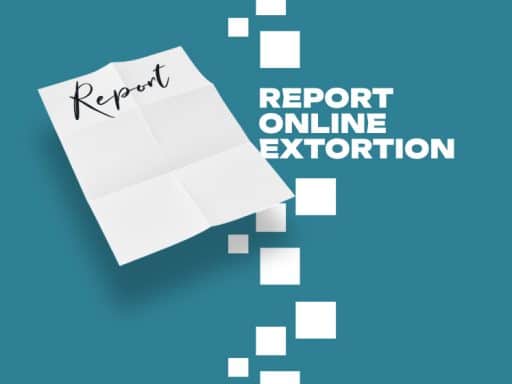With over 3.29 billion active users globally(1), Facebook continues to hold the number one spot as the largest social media platform year after year. Unfortunately, this massive user base makes it an attractive target for malicious activities, such as Facebook sextortion.
Whether you use the platform frequently or just log in occasionally, it is important to know what you can do in case you become a victim of sextortion on Facebook.
Why is Sextortion A Concern for Facebook Users?
Social media platforms, particularly Facebook, allow individuals to share their personal moments with others, stay in touch with family, and meet new friends. However, this level of openness can also draw in those with harmful intentions. The fact that scammers can hide their identities with the help of stolen images and fake names is a major concern for the entire online community.
The added level or public embarrassment and private humiliation is what makes sextortion one of the most insidious and harmful forms of blackmail on Facebook.
How Does Sextortion Occur on Facebook.
Sextortion on Facebook often involves victims feeling ashamed to seek help due to the nature of the situation. The sextortionist threatens to share sexual content with friends, family, or coworkers unless a sum of money is given.
Victims receive a random message on their Facebook Messenger from an attractive person. The conversation becomes flirtatious and sexual. The victim is manipulated with compliments and love bombing to make them believe the person is interested in them.
Once a connection is made, they will then move the conversation to another platform, such as WhatsApp or a private texting app, claiming that they do not check Facebook often. This is a key tactic in the scam, where they can continue their manipulation without Facebook’s protection.
The scam will take a darker turn when the blackmailer convinces the victim to send intimate photos or videos, creating a never-ending cycle of harassment and threats. Sextortionist will go after the victim’s whole friend list, prioritizing family members and close connections of the victim with threats of exposure.
Does Facebook Help Victims of Sextortion
Facebook is taking steps to help victims of sextortion by raising awareness about safety and providing resources for support. The platform’s policies(2) address and advise on penalties for sharing intimate images without consent on their platform. However, there is no current activity as of January 2025 that prevent cybercriminals from re-joining the platform through new burner accounts.
In response, Meta, along with over 50 organizations, backed the launch of StopNCII.org(3). The first initiative of its kind globally that allows victims of non-consensual intimate images to halt the distribution of such content. The program employs a hash-based matching tool that detects and removes previously uploaded explicit content.
Facebook’s main function is to provide a community space rather than act as law enforcement or cybersecurity services. Therefore, the responsibility does fall to the users to ensure their safety.
What to Do If Sextorted on Facebook?
Many victims are unsure of how to respond when confronted by a sextortionist or how to deal with Facebook sextortion. If you find yourself in this predicament, the first thing to do is to remain calm.
You might experience feelings of panic, fear, or embarrassment, but acting impulsively can lead to decisions you might regret later. Instead, consider these steps:
- Use Facebook’s built-in reporting tools to report the blackmail incident to Facebook. This can help stop the scammers from reaching out to other potential victims.
- Reach out to law enforcement and file a report. In some states, sextortion can be classified as a form of blackmail or extortion.
- Collaborate with cybersecurity professionals, such as Digital Forensics Corp., who can assist you in tracking down the scammer and securing your online safety.
Will Your Blackmailer Follow Through with Their Threats?
Yes, these scammers can carry out their threats to expose you on Facebook. According to a 2023 survey by Digital Forensics Corp., there is a 42% chance(4) that even if a victim pays, the scammer may still go ahead and release the incriminating images or videos they possess. Do you want to know more about it? Read this: How Often Do Sextortionists Follow Through?
The exposure risks associated with Facebook’s Messenger and group messaging features are heightened by blackmailers who use images of pre-crafted messages as leverage to ensure compliance.
Contact Digital Forensics Corp. And Stop Sextortion today.
Digital Forensics Corp. is ready to step in if you or someone you care about has fallen victim to Facebook sextortion. Our monitoring services are designed to help stop the further spread or uploading of your content. We utilize the latest cybersecurity tools to track down the digital footprints that scammers leave behind, such as IP addresses and financial records.
Contact our Sextortion Helpline and regain control of the situation.
Resources:
- https://investor.atmeta.com/investor-news/press-release-details/2024/Meta-Reports-Third-Quarter-2024-Results/default.aspx
- https://about.meta.com/actions/safety/topics/bullying-harassment/stop-sextortion
- https://about.fb.com/news/2021/12/strengthening-efforts-against-spread-of-non-consensual-intimate-images/
- https://www.digitalforensics.com/blog/sextortion-online/how-often-do-sextortionists-follow-through/
DISCLAIMER: THIS POST IS FOR INFORMATIONAL PURPOSES ONLY AND IS NOT TO BE CONSIDERED LEGAL ADVICE ON ANY SUBJECT MATTER. DIGITAL FORENSICS CORP. IS NOT A LAWFIRM AND DOES NOT PROVIDE LEGAL ADVICE OR SERVICES. By viewing posts, the reader understands there is no attorney-client relationship, the post should not be used as a substitute for legal advice from a licensed professional attorney, and readers are urged to consult their own legal counsel on any specific legal questions concerning a specific situation.






